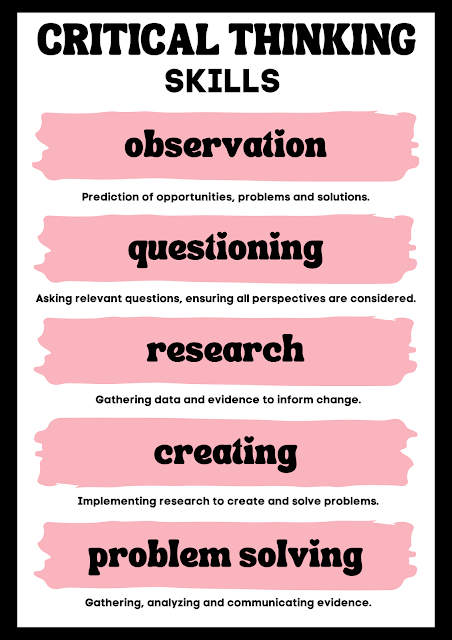Critical thinking has always been an important skill for students and this importance has even grown bigger in the digital era where all kinds of information (and disinformation) is only a click away.
Indeed, in a digitally focused world where there is an exceeding surplus of amateurish and unreliable information, the ability to critically assess and evaluate information becomes an imminent need.
Critical thinking starts with posing questions, ones that disrupt the taken for granted and look at things from different perspectives. There are several types of critical thinking questions you can use with your students to encourage them to develop a critically inquisitive mindset. Check out examples of critical thinking questions for students to learn more.
In today’s post, I am sharing with you this handy collection of TED Ed lessons on the theme of critical thinking. You can use them as an educational resource to further help students understand the importance of Critical thinking and develop their critical thinking skills.
1. 5 tips to improve your critical thinking - Samantha Agoos
"Every day, a sea of decisions stretches before us, and it’s impossible to make a perfect choice every time. But there are many ways to improve our chances — and one particularly effective technique is critical thinking. Samantha Agoos describes a 5-step process that may help you with any number of problems".
2. The Boltzmann brain paradox - Fabio Pacucci
"How do you know you’re a person who has lived your life, rather than a just-formed brain full of artificial memories, momentarily hallucinating a reality that doesn’t actually exist? That may sound absurd, but it’s kept several generations of top cosmologists up at night. They call it: the Boltzmann brain paradox. Fabio Pacucci explores this mind-numbing thought experiment."
3. Can you outsmart the college admissions fallacy? - Elizabeth Cox
"It’s 1990. A prospective student has filed a complaint about Virginia Military institute’s admissions policy that excludes women. The state argues that VMI’s single sex education is an “important governmental objective” and that the exclusion of women from VMI is essential to that objective. Can you spot the problem with this argument? Elizabeth Cox explores the circular reasoning fallacy."
4. Can you solve the fortress riddle? - Henri Picciotto
"Bad news: your worst enemies are at the gate. Your fledgling kingdom guards the world’s only herd of tiny dino creatures. To you, they’re sacred. To everyone else, they’re food. The three closest nation-states have teamed up to smash open your walls and devour the herd. Can you build fortifications for your kingdom before the siege weapons arrive? Henri Picciotto shows how."
5. Can you solve the private eye riddle? - Henri Picciotto
"As Numberland’s best detective, you thought you’d seen it all. But the desiccated corpses of prominent natural numbers have been showing up all over the city. A lockdown is ordered from sundown to sunrise, and it’s still not enough to stop what can only be described as a vampiric feeding frenzy. Can you figure out why the citizens of Numberland are being attacked? Henri Picciotto shows how."
6. Ethical dilemma: Who should you believe? - Alex Worsnip
"You’re sitting on the couch, when you hear a knock on the door. The police have arrived to arrest your spouse— for murder. This accusation comes as a total shock, but their fingerprints were found on the murder weapon.
Your spouse insists they’re innocent. Should you believe your spouse, even though the evidence against them looks damning? Alex Worsnip takes a look at this classic ethical dilemma."
7. Can you outsmart the slippery slope fallacy? - Elizabeth Cox
"It’s 1954. Vietnamese nationalists are on the verge of securing an independent Vietnam under communist leader Ho Chi Minh. U.S. President Eisenhower claims that by virtue of the "falling domino principle," communist control of Vietnam would lead to the global spread of authoritarian communist regimes. Can you spot the problem with this argument? Elizabeth Cox explores the slippery slope fallacy."
8. Why people fall for misinformation - Joseph Isaac
"In 1901, David Hänig published research that led to what we know today as the taste map: an illustration that divides the tongue into four separate areas. It has since been published in textbooks and newspapers.
There is just one problem: the map is wrong. So how do misconceptions like this spread, and what makes a fake fact so easy to believe? Joseph Isaac dives into the world of misinformation."
9. How do you know what's true? - Sheila Marie Orfano
"A samurai is found dead in a quiet bamboo grove. One by one, the crime’s only known witnesses recount their version of the events. But as they each tell their tale, it becomes clear that every testimony is plausible yet different.
And each witness implicates themselves. What’s going on? Sheila Marie Orfano explores the phenomenon of warring perspectives known as the Rashomon effect."
10. This tool will help improve your critical thinking - Erick Wilberding
"Socrates, one of the founding fathers of Western philosophical thought, was on trial. Many believed he was an enemy of the state, accusing the philosopher of corrupting the youth and refusing to recognize their gods.
But Socrates wasn’t feared for claiming to have all the answers, but rather, for asking too many questions. Erick Wilberding digs into the technique known as the Socratic Method".



